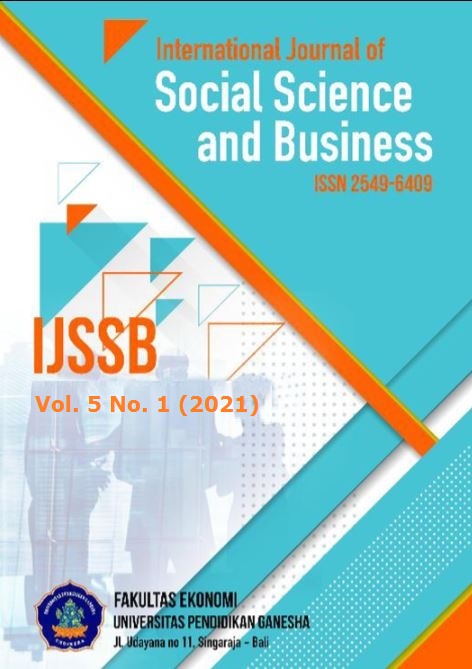Prohibition of Violations of Heavy Human Rights
DOI:
https://doi.org/10.23887/ijssb.v5i1.32693Abstract
This study aims to analyze the clause on protecting human rights Article 2 of the UDHR and the state responsibility for the types of genocide crimes of Article 6 of the Rome Statute as a response to the fanaticism of religion, culture, freedom, anarchy, radicalism, and underestimating pluralism, which tends to discriminate, witness and allowing people to kill, kill, and rape large numbers of nations. Type of normative legal research. The research approach used is a statutory approach and a case study approach. The results show that human rights violations by borrowing the concept of performative self-contradiction from the theory of criminology, legal protection, and state responsibility provide protection for citizens who assert their rights are severely limited by Article 2 of the UDHR's human rights protection clause and responsibility Article 25 states against the protection of human rights. Further understanding and unifying the various legal cases that Article 6 has produced so far: both target political human rights violations, attack liberal democracy in general; and the abuse of exclusive human rights, attacking the rights of others. Category of genocide or not, we need to pay attention to 2 (two) things, namely Actus Reus (action) and Mens Rea (evil intention) in action.
References
Anggreni, I. A. K. N., Mangku, D. G. S., & Yuliartini, N. P. R. (2020). Analisis Yuridis Pertanggungjawaban Pemimpin Negara Terkait Dengan Kejahatan Perang Dan Upaya Mengadili Oleh Mahkamah Pidana Internasional (Studi Kasus Omar Al-Bashir Presiden Sudan). Jurnal Komunitas Yustisia, 2(3), 227-236. http://dx.doi.org/10.23887/jatayu.v2i3.28787
Arianta, K., Mangku, D. G. S., & Yuliartini, N. P. R. (2020). Perlindungan Hukum Bagi Kaum Etnis Rohingya Dalam Perspektif Hak Asasi Manusia Internasional. Jurnal Komunitas Yustisia, 3(2), 166-176. http://dx.doi.org/10.23887/jatayu.v3i2.28849
Assefa, H. (1990). Religion in the Sudan: Exacerbating Conflict or Facilitating Reconciliation? Bulletin of Peace Proposals, 21(3), 255-262. https://doi.org/10.1177%2F096701069002100302
Begem, S. S., Qamar, N., & Baharuddin, H. (2019). Sistem Hukum Penyelesaian Pelanggaran Hak Asasi Manusia (HAM) Berat Melalui Mahkamah Pidana Internasional. SIGn Jurnal Hukum, 1(1), 1-17. https://doi.org/10.37276/sjh.v1i1.28
Bethuel Kiplagat. 2005. “Role of Religion in Conflict Resolution. Relationship between State and Religious of Organization”, Institut Universitaire de Hautes Etudes Internationales.
Chan, T. (2010). Moore’s paradox is not just another pragmatic paradox. Synthese, 173(3), 211-229. https://doi.org/10.1007/s11229-008-9403-x
Davenport, C., & Armstrong, D. A. (2004). Democracy and the violation of human rights: A statistical analysis from 1976 to 1996. American Journal of Political Science, 48(3), 538-554. https://doi.org/10.1111/j.0092-5853.2004.00086.x
Drew, N., Funk, M., Tang, S., Lamichhane, J., Chávez, E., Katontoka, S., ... & Saraceno, B. (2011). Human rights violations of people with mental and psychosocial disabilities: an unresolved global crisis. The Lancet, 378(9803), 1664-1675. https://doi.org/10.1016/S0140-6736(11)61458-X
Fearon, J. D., & Laitin, D. D. (2003). Ethnicity, insurgency, and civil war. American political science review, 97(1), 75-90. https://www.jstor.org/stable/3118222
Harris, D. J., & Sivakumaran, S. (2004). Cases and materials on international law (Vol. 134). Sweet & Maxwell.
Jones, A. (2010). Genocide: A comprehensive introduction. Routledge.
Kitab Undang-Undang Hukum Pidana (KUHAP).
Kovenan Internasional Hak Sipil dan Politik (ICCPR).
McCormick, J. M., & Mitchell, N. J. (1997). Human rights violations, umbrella concepts, and empirical analysis. World Politics, 510-525. https://www.jstor.org/stable/25054017
Neumayer, E. (2005). Do international human rights treaties improve respect for human rights? Journal of conflict resolution, 49(6), 925-953. https://doi.org/10.1177%2F0022002705281667
Orentlicher, D. F. (1991). Settling accounts: The duty to prosecute human rights violations of a prior regime. Yale Law Journal, 2537-2615. https://doi.org/10.2307/796903
Preambule Statuta ICTR.
Protokol I Konvensi Geneva tertanggal 8 Juni 1977.
Protokol tambahan Konvensi Geneva 12 Agustus 1949.
Sabon, M. B., & SH, M. (2020). Hak Asasi Manusia: Bahan Pendidikan untuk Perguruan Tinggi. Penerbit Universitas Katolik Indonesia Atma Jaya.
Sefriani, S. (2007). Yurisdiksi ICC terhadap Negara non Anggota Statuta Roma 1998. Jurnal Hukum IUS QUIA IUSTUM, 14(2).
Shaw, M. N. (2008). International law. Cambridge University Press.
Sriram, C. L. (2004). Confronting past human rights violations. Routledge.
Statuta Roma. Statute for an International Criminal Court (Statuta Mahkamah Pidana Internasional).
Ubaedillah & Abdul Rozak. (2008). Pendidikan Kewarganegaraan, Demokrasi, Hak Asasi Manusia dan Masyarakat Madani, Indonesian Center for Civic Education (ICCE). Kencana Prenada Media.
UN Commission on Human Rights, Report of the Independent Expert to Update the Set of Principles to Combat Impunity (E / CN.4 / 2005/102 / Add.1), February 8, 2005.
UN General Assembly, Rome Statute 1998, Article 5 (1).
Undang-Undang Nomor 39 Tahun 1999 tentang Hak Asasi Manusia.
Undang-Undang Republik Indonesia Nomor 26 Tahun 2000 tentang Pengadilan Hak Asasi Manusia.
UUD Negara Republik Indonesia Tahun 1945
Uyangoda, J. (2007). Ethnic conflict in Sri Lanka: changing dynamics. Departemen of Political Science and Public Policy: University of Colombo.
Vienna Convention on the Law and Treaties, 1958.











